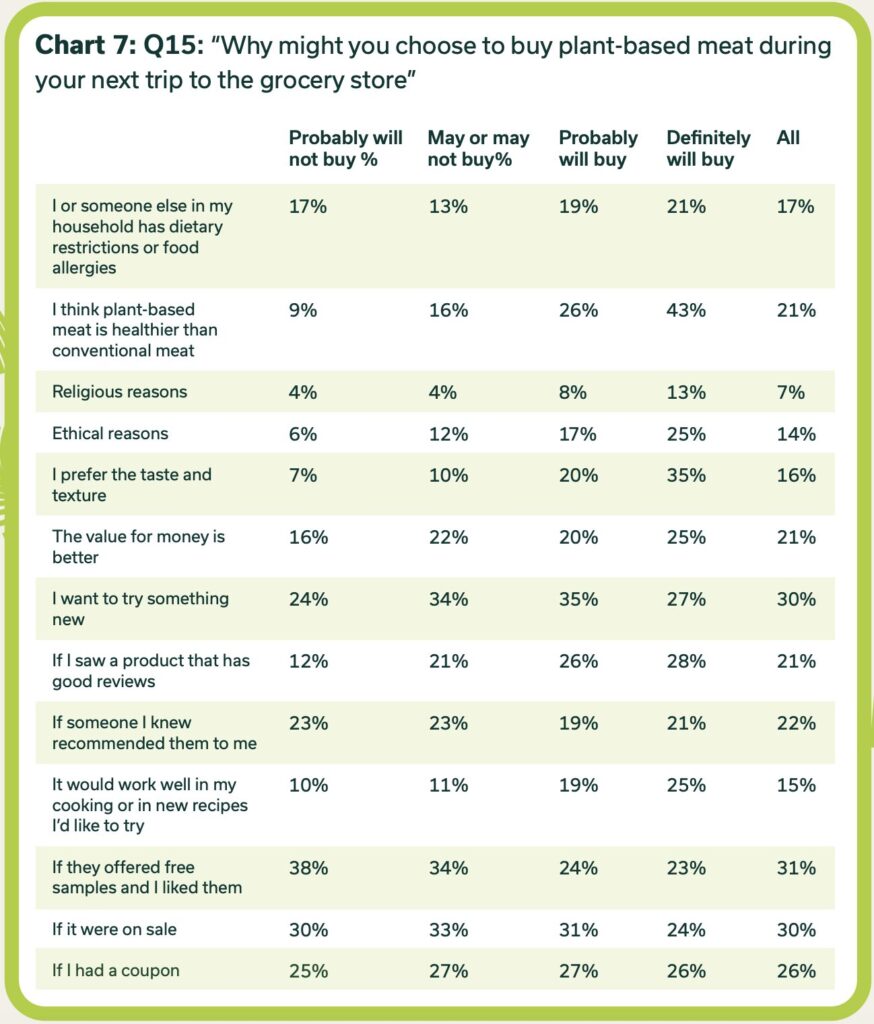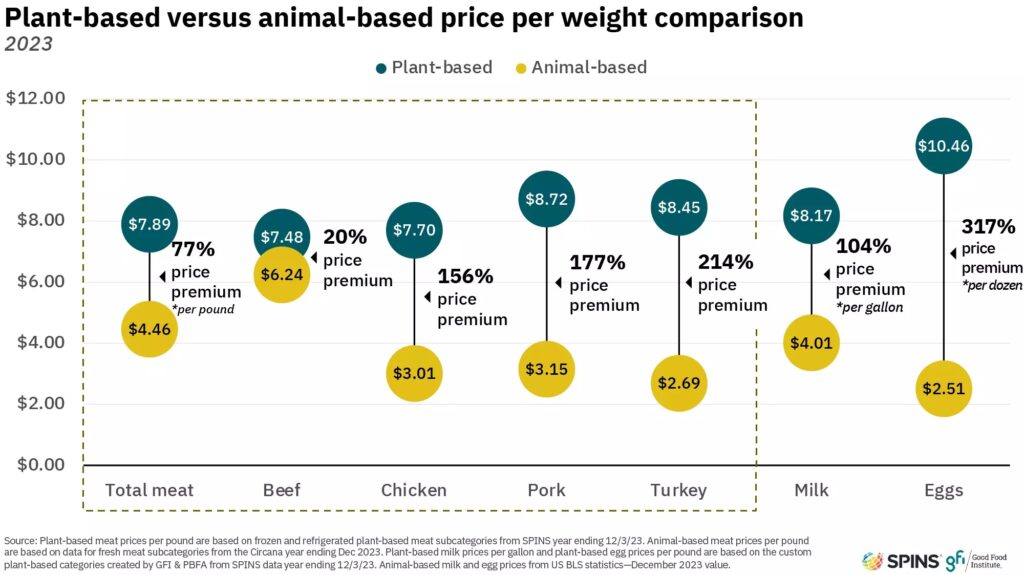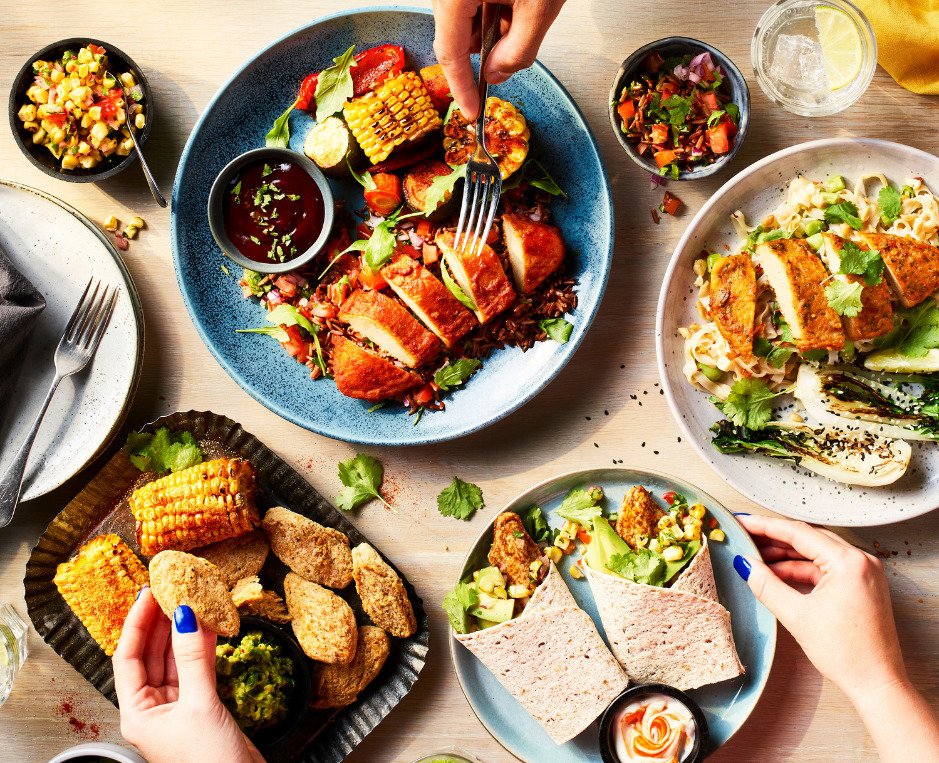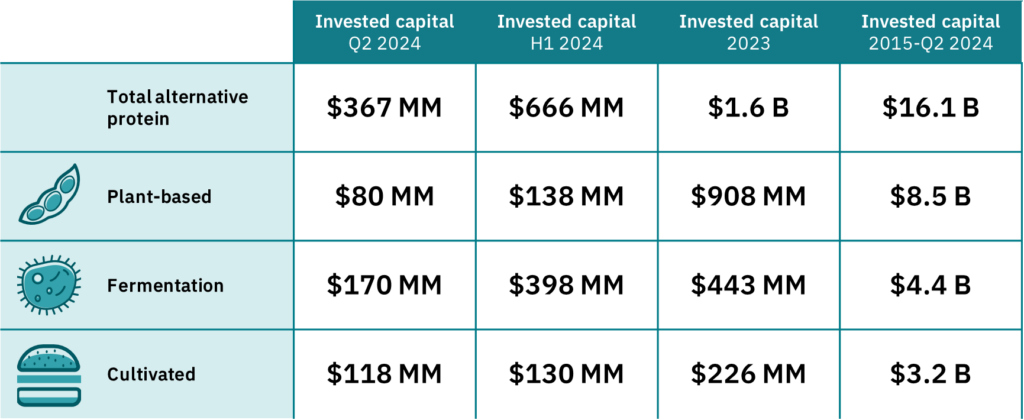Plant-Based Meat Sales Down By 19% in US Retail, But Industry Optimistic About Future
6 Mins Read
Retail sales of plant-based meat products in the US have continued to slow, dropping by 19% from last year – but industry experts have remained positive over this period.
Americans spent 18.6% less on chilled plant-based meat in the 52 weeks to May 19 (reaching $310.5M), compared to the same period a year ago, according to market research firm Circana. This coincided with a 21% drop in the volume of meat analogue products they bought from supermarket fridges.
Similarly, volume sales for frozen meat analogues totalled 90.1 million (much higher than the 36.9 million units sold in the fresh aisle), representing an 11.7% decline. Here, these products raked in $725.8M, a 6.6% loss in value sales.
Even the best-selling products in each section witnessed volume declines. In the fresh plant-based meat department, dinner sausage, ground, and patties saw units down by 22.6%, 13%, and 34.6%, respectively. Likewise, purchases of vegan patties, strips/cutlets, and nuggets decreased in volume by 13.9%, 11.9%, and 17.5%, respectively.
High prices, unsatisfactory taste and texture, and concerns around ingredients are limiting sales, according to analysts. This has deterred shoppers from repeat purchases, according to Chris DuBois, executive VP of fresh foods and protein at Circana.
“The decline in meat alternative sales reflects broader changes in grocery purchasing due to the continued pressures of cost of living – we’re seeing consumers trading down and returning to familiar foods to save money,” Joanna Trewern, director of partnerships and institutional engagement at ProVeg International, told Green Queen.
But she argued that consumer demand for these products isn’t slowing down. “60% of US households purchased plant-based foods in 2023, highlighting the opportunities for success for forward-thinking brands,” she said. “95% of households that bought plant-based meat also bought animal-based meat, underscoring the importance of products that can successfully cater to flexitarian and omnivore consumer expectations.”
Price, taste and texture concerns hurt sales

A 1,500-person survey earlier this year found that taste and texture are the greatest barriers to Americans eating plant-based meat, with only 16% saying these attributes would motivate them to purchase meat analogues in supermarkets. That said, 91% of respondents who have tried plant-based protein like the taste and texture of these products.
“The ingredients are too complex and more highly processed than animal proteins, and very few people will pay a premium, especially with inflation and with meat prices, except for beef, coming down,” DuBois told Supermarket News. However, processed meats are equally or often more processed than vegan analogues, a fact that hasn’t come through in the rise of reporting around ultra-processed foods.
Then there’s the price tag. Circana found that the price of fresh meat analogues was up by 3.3% from the same period a year ago, reaching an average of $8.41 per lb. Similarly, frozen products in this space saw costs rise by 5.8% to $8.06 per pound.
A poll by Kroger-owned research firm 84.51° revealed that the cost of plant-based meat is prohibitive for 53% of Americans, driving them to eat less of it. This is why “getting the pricing right” is crucial for the industry, according to DuBois.
“Today’s consumer expects plant-based products that are tasty, affordable and nutritious. Enhancing taste and texture, ensuring pricing is competitive, and focusing marketing on taste and excitement will be important to drive the category back into growth,” said Trewern.

The Circana figures mirror SPINS data crunched by the Good Food Institute earlier this year, which revealed that plant-based meat and seafood saw sales decrease by 12% in US retail in 2023, reaching $1.2B. When it came to volume sales, this was an even larger 19% decline.
Prices were also up by 9%, compared to just 3% for conventional meat and seafood. In fact, vegan beef was the closest to price parity, but still had a 20% markup over its animal-derived counterpart. Overall, meat analogues remained 77% more expensive in American supermarkets last year.
Only 15% of American households bought these products last year, but contrary to DuBois’s assertion, 62% of them were repeat purchasers.
“What’s clear is that growing the category will require stakeholder collaboration. In Germany, supermarket chain Lidl introduced a price parity commitment for its private-label plant-based products in 2023. Volume sales grew [by] 30% as a result of this action,” Trewern said.
Billion-dollar plant-based category ‘not going away’

Circana’s figures come after a couple of tough years for the plant-based industry, which saw VC investment dip by 24% last year. But in this time, company executives and industry experts alike have all remained optimistic.
“We can’t hide away from the fact that plant-based meat categories have been in decline over the past year, or two,” Matthew Glover, co-founder of the UK-based Vegan Food Group, told Green Queen in February. “There’s a multitude of factors at play, including the cost-of-living crisis, meat industry misinformation campaigns successfully turning consumers away, as well as products not meeting expectations. Retailers reducing shelf space hasn’t helped.”
Godo Röben, former managing director of German meat and plant-based giant Rügenwalder Mühle, and an investor in whole-cut meat startup Project Eaden, said last month: “There are only [a] few products consumers really love. It’s a ‘bestseller’ market rather than an even distribution of success. I believe there is a lot of room to consolidate the current offer and substitute ‘so-so products’ with really good ones.”
This is a sentiment echoed by Peter McGuinness, CEO of Impossible Foods, which leads the refrigerated meat analogue market in the US. “There are a lot of companies that are making food that’s not great food. There’s 200 plant-based companies in America – [we] probably only need three, or two. So there’s a lot of small companies making not-so-great food and people are having bad first impressions,” he told Bloomberg Television.
“That’s good for consumers because overall quality and value for money will improve, and it’s good for retailers because repeat buys and rotation in the plant-based alternative shelves will increase,” said Röben.
But as Quorn CEO Marco Bertacca pointed out, the slowdown in the category mirrored many others, and comes “against the backdrop of many consecutive years of incredible growth in meat-free eating”. This is something DuBois also agrees with, noting how the sector “still is a billion-dollar category” and is “not going away”.

The industry’s trials have prompted ProVeg International to label this period a “correction phase”, especially since venture capital is still hard to come by. In the first six months of this year, plant-based companies only attracted 15% of what was poured into the sector in 2023. “We expect to see the effects of consolidation, along with signs of recovery in the sector, between 2025-26, with more corporate investors driving innovation in the sector,” Hédi Farhat, investment manager at ProVeg Incubator, told Green Queen in April.
Andy Jarvis, director of the Bezos Earth Fund’s Future of Food programme, explained how its alternative protein centres are aiming to “reduce price, boost deliciousness, and improve the health benefits” in an interview with Green Queen last month. “If you do that, you’re driving their market share. So what we’re looking for is that this takes 10-20% of global market share over the next decade or so,” he said. “And if you have 10% or 20% market share, you’re having planetary-level impacts.”



